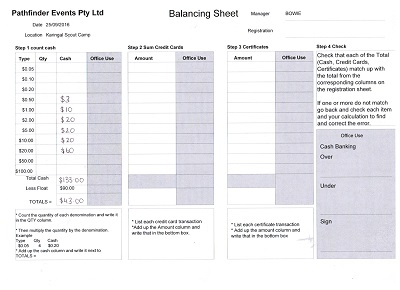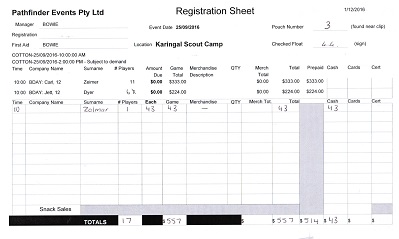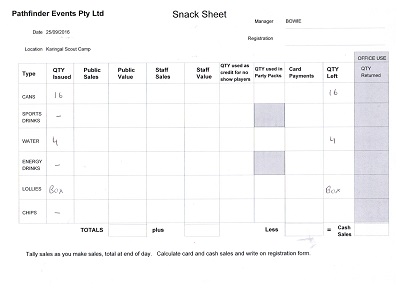As successful Battlefield Businesses, your business provides something of value. In our case, live-action gaming experiences. People book your tickets because they want what you offer.
Your battlefield business offers experiences at a price customers are willing to pay, satisfying the client's needs and expectations.
Bottom line, your business needs to do this in a way that brings in sufficient profit to make it worthwhile for the owners.

You're not alone if you’ve ever looked at your bank account after a busy season and thought, “Where did all the money go?”.
Many Battlefield Operators run amazing games, keep customers happy, and generate solid revenue, but they still struggle with cash flow.
Running games is your zone of genius — but managing money doesn’t have to be a battle.
As they say, Rome wasn't built in a day, but you can start growing your Battlefield Business with good cash flow management and cash handling tips.
Battlefield Sports has created a free Cash Flow Calculator. How much cash you can generate depends on the number of laser taggers (gaming guns) you have in your arsenal, how often you use them, and your ticket price.
1. Adopt a Profit-First Mindset for Sustainable Growth Traditional accounting puts profit last — but that often leads to burnout and financial strain. The Profit First approach flips the formula so you allocate profit, owner’s pay, and tax first, then run your business on what’s left. This gives you clarity, reduces stress, and builds a more stable, rewarding business.
2. Implement Strong Cash Handling Systems Without clear cash controls, revenue can vanish before you even notice. Create systems for floats, receipts, safes, and drop safes to protect your income. Add checks and balances like third-party audits and smart software to ensure everything adds up — even when you're not on-site.
3. Get Smart About Staffing to Reduce Wage Overheads Labor is one of your biggest costs. Strategies such as pre-payment pricing, upselling, automation, and efficient rostering can reduce your wage-to-revenue ratio — especially when serving larger groups. Invest in high-performing staff and tools to scale without blowing your budget.

I've found Mike Michalowicz's book Profit First helpful. This simple yet powerful book flips traditional accounting on its head.
Instead of the usual formula:
Sales - Expenses = Profit
Profit First teaches:
Sales - Profit = Expenses.
It may sound like a small change, but it makes a big difference.
When running a holiday park or laser tag business, it’s easy to reinvest everything into the business — new taggers, more game props, and marketing campaigns.
Think of "Profit First" as your Quick-Start guide to smarter cash flow and sustainable profit. But if you're not paying yourself properly or building a buffer, you could end up burned out and broke, even while your business looks successful.
The Profit First system helps you break out of that cycle by teaching you to pay yourself first, set aside money for taxes, and get intentional with every dollar.
The system recommends setting up multiple bank accounts, each with a specific purpose.
Income Account: ALL sales income goes into this bank account first.
Profit Account: A percentage (start with 1%) goes here first — this is your reward for owning the business.
Owner’s Pay: This is the Operator's wage. You work hard — pay yourself like you mean it. Instead of the Director's drawings, Peter and I are on the payroll as employees. In Australia, as well as paying a salary, employees must be paid a Superannuation of 12% above wages from July 2025. It's a bit like the United States' 401(k) or the Pension in the UK. In other words, it's an annual premium of wages, compensation insurance, first-aid and uniform allowances, staff training, and the list goes on.
Tax Account: No more scrambling at tax time. In Australia, businesses must pay a monthly or quarterly Business Activity Statement (BAS). This is a statement submitted to the Australian Tax Office (ATO) attesting to the amount of Goods and Services Tax (GST) collected, how much Pay As You Go (PAYG) withholding (for employee wages) PAYG instalments (for income tax). And if you have a vehicle that anyone uses privately and it's not an EV, then Fringe Benefits Tax (FBT) instalments. Likewise, in the UK, there's the VAT return, PAYE (monthly or RTI submissions) and the rest. In the US, small businesses must report Sales Tax collected and paid separately to each state (this varies widely). For employee tax, there's the Federal Form 941 (quarterly). USA SMEs must deal with the Internal Revenue Service (IRS) and State Revenue Agencies.
Long story short: small businesses need to pay a LOT of tax all the time!!
Operating Expenses: What's left is what you run your business on. You get clarity and control by allocating money to these bank accounts regularly. You know what’s available to spend, and you’re not flying blind.
Imagine this: You finish a big weekend of events and immediately transfer 5% of your takings to your Profit Account, 20% to your Tax Account, 10% to your Owner’s Pay, and 65% to your business expenses bank account. This way, you’re building a sustainable business, not just staying afloat. This method helps you avoid the feast-and-famine rollercoaster.
It also gives you the confidence to make wise decisions because you always know how much you can spend — whether on new gear, hiring staff, or investing in marketing.
You don’t need to overhaul your whole system overnight. One of the basic tenets of operating a business is to separate your business and your personal bank accounts.
Assuming you already have a business income back account, start by opening two new business accounts: one for your profit and one for taxes. Transfer a small percentage regularly, and build the habit. Over time, you’ll find it easier to plan, save, and grow.
Mike recommends doing these transfers bi-monthly. But I do these transfers weekly, every Saturday morning.
I find it easier to keep to this rhythm. I divide the previous week's income among the various accounts.
Pro Tip: You don’t need fancy bank accounts — just clear naming and online access.
Hit Pay Dirt With Good Cash Handling Procedures

Floats. We have a float for each venue and each event. We used to keep $110 as the cash float. Nowadays more people pay with cards or their smartphone. Now, we have reduced this to $90. Since we run multiple events simultaneously for mobile laser tag, each venue is allocated a money pouch. See the image for an example of our cash banking after a weekend's events. The floats are issued from the admin office to each Shift C.O. The Battlefield HQ software can print out all the Rego Forms, including the Event Balancing Sheet. There is a spot for staff to sign for their float.
Receipts.  The booking software "Battlefield HQ" records all bookings. Customers are encouraged to pre-pay with big discounts. So, most turnover is deposited directly into the bank via Visa / MasterCard over the phone, directly deposited, or online via credit card or Paypal. At the close of business each day, customers are emailed a copy of their receipt/invoice. Or, if requested, a printed copy can be posted to the customer. So, each day, the cash sales from events and the electronic funds are balanced.
The booking software "Battlefield HQ" records all bookings. Customers are encouraged to pre-pay with big discounts. So, most turnover is deposited directly into the bank via Visa / MasterCard over the phone, directly deposited, or online via credit card or Paypal. At the close of business each day, customers are emailed a copy of their receipt/invoice. Or, if requested, a printed copy can be posted to the customer. So, each day, the cash sales from events and the electronic funds are balanced.
Safes. Do you have a safe? A safe with a combination lock or a key is way more secure than the left-hand drawer on your desk. Once you set up a safe, consider how many people other than you can access it. Keep access to the safe limited.
Drop Safe. At the end of each shift, the C.O. returns the truck, equipment, and cash to the Depot. He or she also returns the pouch to a drop safe at your depot. Then, each Monday, the office staff reconciles and banks the takings.
 That way, cash on-premises in the till, on the battlefield, and in the money pouches is kept to a minimum. The staff who handle the cash are different from those who reconcile it, so there is less chance of the paperwork (and the cash!) being doctored.
That way, cash on-premises in the till, on the battlefield, and in the money pouches is kept to a minimum. The staff who handle the cash are different from those who reconcile it, so there is less chance of the paperwork (and the cash!) being doctored. Petty Cash. Most small businesses need petty cash. Cash from the till to pay for petty cash items is also tracked and recorded. In Australia cash tips are rare, however elsewhere they are common so a system for tracking and divvying up the proceeds is a good idea.
Third-Party Checks. A random check or audit of cash pouches and tills and safes on an ad-hoc basis offers a good chance for "checks and balances". Even if you have fabulous staff, no one is perfect, so getting a third party to check on things is a great idea. 
One of the biggest overheads for many Battlefield Operators is staff wage costs. Shaving off a percentage of your wage costs can help boost your bottom line. Here are seven ideas about how to wage a war of attrition on wages.
It may sound obvious, but employing a fast and efficient team is important to your business. Think about it. Is everyone on your team tip-top? Is there any dead wood? High performers prefer to work with other high performers. So, keeping a slow pace and frustrating your customers might also be off-putting to the rest of the team. Investing in staff training is also vital. If your battlefield business has clear policies about what is expected of the staff, your operation will likely benefit. You want to value, reward, and retain your top-performing staff.
Upselling can make a big difference to your overhead wages percentage. For example, say your monthly turnover is $40,000, and your direct wages are 18%, i.e., $7,200. If your average take per person is $30, then if you can up-sell by just one dollar each, your turnover increases to $42,000, but your wages have stayed the same. In percentage terms, it's dropped to 17%. It sounds simple, but it all helps. Ways to up-sell might include renting camo outfits or selling tubes of war paint.
How you structure your ticket prices can greatly affect the time your field staff takes to register your gamers. Field staff are likely to be part-timers, whereas full-time office staff are likely permanent, so their per-hour rate might be lower.
Say your headline-on-the-day price is $50 for a two-hour session. A $50 bill is one crisp note. No change needed.
Better still, if you offer a discount for pre-payment (e.g., discounted to $39pp for big groups), you can collect the money and manage the admin during your Monday to Friday 9 to 5 workweek rather than on the day of the event (which is likely to be a weekend). If your registration details are organized in advance, you can complete the meet and greet and issue wristbands much more quickly. So instead of registering 50 or so people on the day, you might only take payment on the battlefield for one or two. This also has the benefit that your staff have less physical cash in their hands.
Back in the day, when we had the old classic system, we had to employ one staffer per team to act as referees/medics. Each staffer manually respawned the gamers and counted the number of respawns with their Mark I Brain.
The Battle Boxes can now act as a combination of Ammo & Medic with the digital SATR system. So the box acts as both an Ammo Dump where a gamer can get close to the box and it automatically replenishes their ammo (depending on which weapon emulation their gaming gun has been set to). The box also automatically respawns (aka reactivates) gamers when they approach it.
The SATR laser tag system makes hosting very large groups straightforward. And staff ratios for big groups are more favorable for your bottom line. Say you have up to 30 people playing at an event; in this case, we would roster one crew member up to 30 players. Say you have booked them in for $35 each; that's a $1,050 turnover.
Or imagine you had a group of 10 players booked and they paid $40 per ticket, that's a $400 turnover.
In Australia, wage rates are determined by the Modern Awards. For a casual employee to run an event, the rate is $35.15 per hour (plus on-costs) from Monday to Saturday. On Sundays, the rate is $49.21 per hour (plus on-costs).
To keep this example simple, let's say we are running an event on a Saturday and the crew member is rostered on for 6 hours.
In the first example, wages account for approximately 20% of turnover. In the second, this climbs to a whopping 53% of revenue. Ouch!
Tightening up start and finish times can make a difference to your wages. Over a year, this can certainly add up. If you run a mobile laser tag business, the average drive time between your HQ and the event can be calculated using Google Maps. If there is a big difference, then find out why. There might be a perfectly good explanation, such as a motor vehicle accident on the Interstate or Motorway, but it is a good idea to ask the question.
Apps like Life360 can keep track of your employee's location. Apps like WhenIWork can roster the crew on different days and enable them to log on and off.
Running a Battlefield business should be rewarding—financially and personally.
I started my Battlefield business to make a difference, to offer gamers less screen time and more green time. You might have a similar purpose.
Cash flow management is about progress, not perfection.
Track your allocations for three months and make tweaks based on real data. For example, I had to bump up my percentage allocated to tax. (Remember? SMEs pay a LOT of tax all the time!)
Profit First gives you a roadmap. It’s not about working harder. It’s about being smarter with what you earn.
Grab your copy of Profit First here
Join the conversation in the Battlefield Operators Facebook Group
* Found this helpful? Share this article with a fellow operator who wants to make more and stress less.
Are you ready to arm yourself for adventure? Take the Quiz!
©2025 All rights reserved